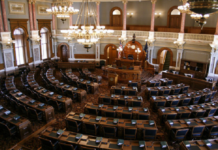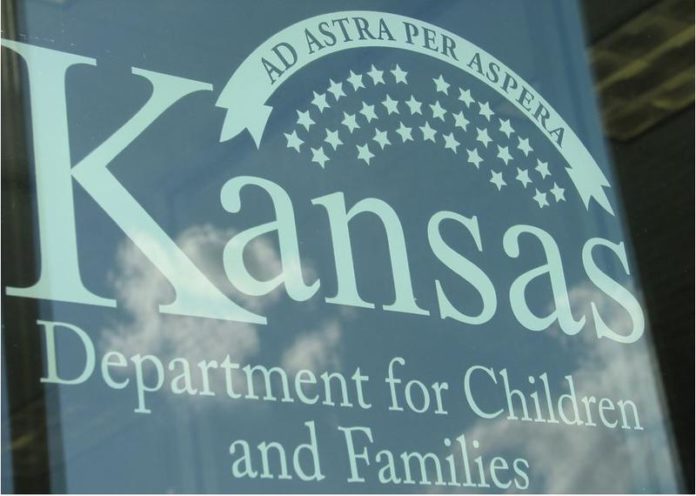For a second time, House Majority Leader Dan Hawkins is accusing Democratic Gov. Laura Kelly’s administration of not complying with a hotly contested overhaul of the state’s welfare law from five years ago.
In a letter sent to the governor this week, Hawkins said the Department for Children and Families is not adhering to a state law that requires a photograph of anyone receiving food assistance — if they agree — to be placed on their benefits card.
“The rampant unemployment fraud our state has recently experienced at the Department of Labor only reinforces the need for safeguards to prevent fraudulent use of taxpayer dollars,” Hawkins said in his letter.
“Your administration recently noted its concern regarding identity theft and rampant fraud occurring with unemployment insurance claims in Kansas,” he wrote.
“I am pleased that you have acknowledged the need for robust program integrity and look forward to hearing from your administration on its efforts to do the same with Kansas benefit cards,” Hawkins wrote.
The photo ID was part of the sweeping HOPE Act legislation enacted in 2015 under former Gov. Sam Brownback’s administration that reduced the amount of time people could receive cash assistance and imposed tighter work requirements for receiving benefits.
The changes – its opponents called it the “Hopeless Act” – were criticized by some as limiting access to government benefits for those most in need while others saw the changes as a way to encourage work and lift Kansans out of proverty.
A spokesman for DCF acknowledged this week that the agency does not currently place a photo on the Kansas benefits card.
Mike Deines said the requirement wasn’t adopted after it passed because previous Republican administrations — Brownback and former Gov. Jeff Colyer — found there were administrative obstacles.
Deines said the Brownback and Colyer administrations discovered there would be several barriers to implementation, including high costs, a burden on information technology resources as well as federal barriers.
“The program was given a low priority,” Deines wrote.
He added that the agency did get federal approval for the photo ID in 2018, but it never moved forward because the conditions required by Food and Nutrition Services at the U.S. Department of Agriculture were never met.
Deines said there are “real world concerns” that need to be addressed.
He said retailers can’t refuse a benefits card from any recipient, so having a photo on the card would not limit a purchase.
He also added that retailers cannot pay any special scrutiny toward food-assistance recipients, and most who use the card can complete self-checkout.
There are also other concerns including the collection of photos leading to untimely delivery of the benefits card, which is a violation of federal regulation, he said.
It would also place an additional burden on clients who would have to make an extra trip to a DCF office even though most eligibility is handled electronically or by phone.
Deines added that DCF has a “robust identity verification and fraud detection system utilizing several information sharing methods.”
He said agency policy requires workers to verify the identity of all adults accessing benfits, which includes checking against Social Security records, child support services records, Kansas quarterly wage and unemployment records, immigration status as well as birth and death records and driver’s license information.
This is the second time Hawkins has questioned whether the Kelly administration is complying with the changes made in the welfare benefits law in 2015 that the governor has described as “destructive” for Kansas’ less affluent population.
Two years ago, Hawkins accused the Kelly administration of trying to get around the state’s welfare work requirements.
Hawkins cited a memo issued by DCF that he said was an attempt to circumvent a state law setting a three-month time limit for able-bodied adults without dependents to receive food assistance without working.
Kelly later withdrew the policy that extended the timeline for providing food assistance after Republican Attorney General Derek Schmidt questioned its legality.
“Current GOP leaders would rather see us continue on the disastrous path of the Brownback-Colyer administrations whose policies did significant harm to Kansans,” Kelly said at the time.
“They instituted reckless income tax cuts with practically no positive return for the state while also undermining sensible strategies such as a food assistance program designed to improve children’s health and ability to learn,” she said.
Kansas Action for Children, which opposed the Hope Act, criticized Hawkins for focusing “on administrative squabbles.”
“For years, Kansas law has made it far too difficult for kids and families to regain stable footing as they work through hard times,” KAC President and CEO John Wilson said in a statement.
“Why are we making it harder for parents to provide food, housing, and child care for their kids?” he asked.
“We should ensure benefits go to all who need them, rather than using Kansans as political pawns.”















